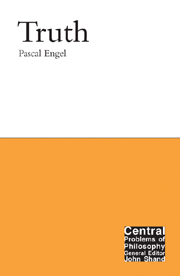5 - The norm of truth
Summary
We have been dealing mostly with what truth is, or is not, but we have not yet said very much about the point of the concept of truth, what truth is for, and what role it plays in our lives. Nobody, not even a deflationist, disagrees that it plays a role, and that the concept of truth is useful. If we look at the function of truth in a naturalist setting, there is no doubt that it has been important for our evolutionary histories that we were creatures able to have true rather than false beliefs, able not only to represent our environment correctly, but also to represent the beliefs of others, in order to predict their actions. As linguistic creatures, it is also quite important for us not only to have various ways of expressing our beliefs, but also to group them together, to refer to them, and to be able to distinguish truth-tellers from liars. But does that license us to say that truth is the goal of our inquiries, that the search for truth is an ultimate theoretical aim, or even an ultimate practical objective, the very foundation of wisdom? Many philosophers, in this sense, who are prepared to follow Aristotle when he says, at the very beginning of the Metaphysics, that “all men by nature desire to know” (Metaphysics: A, 980a21), are more reluctant to follow him when he says, at the end of the Nicomachean Ethics, that “perfect happiness is a certain theoretical activity” (Ethics: X, 1178b 7).
Information
- Type
- Chapter
- Information
- Truth , pp. 125 - 146Publisher: Acumen PublishingPrint publication year: 2002
